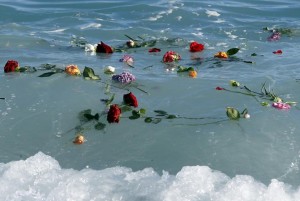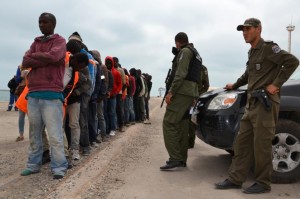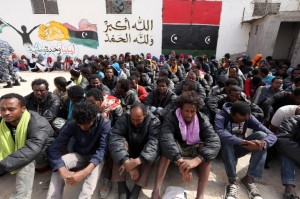By Karim Lebhour

The journey costs between $2,500 and $5,000, a fortune, but one that most think they can pay back as soon as they strike gold in Europe.
ON the walls of homes in the poor Cherkos neighbourhood of Ethiopia’s capital, the portraits of “martyrs” killed in their attempt to enter Europe offer a grim warning.
The murders of several Ethiopian Christians last month in Libya by the Islamic State horrified Ethiopians and sparked global condemnation, including from Pope Francis who expressed his “great distress and sadness”.
At least five of the victims out of the group of 28 migrants on the gruesome video were recognised as coming from this poor neighbourhood in the heart of the Ethiopian capital and its tightly packed clusters of simple brick, tin roof buildings.
“We were about to leave, now we will wait a bit, but not too long,” said one young man aged around 20, sitting with friends, all shocked by having watched the horrific executions on their mobile telephones.
“In a few months this will all be forgotten. But our situation has not changed.”
Sitting on the side of the street and recounting their frustrations, the three young men instead point to the “20 or so” migrants who they say they know have made it to Europe—to Malta, Sweden, Britain and Germany.

“They’ve transformed their lives and the lives of their families,” one of them said.
Ethiopia’s economy is one of the best performers in Africa, and foreign investment is pouring in. But without any qualifications, the young men say they have little hope of a good job—beyond labouring for around 50 biirs (just under $3) a day.
The way out is well-known: a bus ride to neighbouring Sudan, then the crossing of the Sahara desert to reach the Libyan capital Tripoli, which is 3,700 kilometres (2,300 miles) from Addis Ababa. After that it’s a case of finding a boat to Italy.
In all, the journey costs between $2,500 and $5,000, a fortune, but one that most think they can pay back as soon as they strike gold in Europe.
The lucky ones reach Europe in a few weeks, with Ethiopians declaring themselves Eritreans in order to seek asylum. Some, however, end up stuck in Libya, short of cash. Others simply disappear.

‘Question of luck’
Baheru Lemme, who runs a church-based youth association, is trying to convince young Ethiopians to stay, but he admits that is a huge challenge.
“Too many families encourage their children to leave so they can send back some money, rather then invest instead in their education,” he said.
“I tell them about the dangers of the journey. I tell them they can change their lives by staying here and working hard, but they are pessimistic.”
Baheru said that even after the executions carried out by Islamic State militants, two more locals have left for Libya in recent days.
“I tried to reason with them, but they said that if they die then they’ll be martyrs,” he said, adding he had given them a Bible for their journey.
Ethiopia’s government is also trying to put off would-be migrants, with measures including tougher laws against human traffickers.
Not far from where Baheru runs his church group, a funeral was being held for Biruk Kassa, one of the victims who appeared on the video. Among the mourners, family friend Ferek admitted he still dreamt of Europe despite the obvious risks.
“If I had the money to pay the smugglers, I’d go right away,” he said, complaining that at 24 and even as a student of marketing, he believed he had few prospects. In Britain, however, he believed he could earn the equivalent of a monthly salary in a day.
As for the dangers of the journey, he shrugs his shoulders: “Some make it, others don’t. It’s a question of luck.”
Source: AFP


